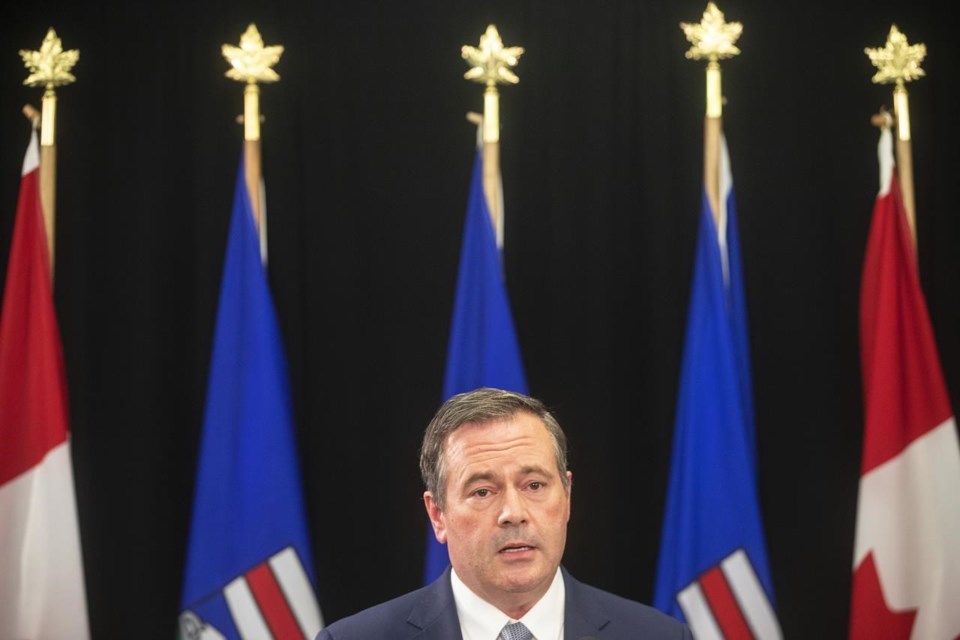EDMONTON — Alberta is adding more money and doubling fines to help businesses implement and enforce its version of a COVID-19 vaccine passport.
Small and medium-sized businesses that adopt the passport, known in Alberta as a restriction exemption, will get $2,000 to help set it up.
There will also be $1 million for businesses to access to help staff explain the passport program and deal with customers.
Amid reports that some staff are being harassed and abused over the program, the province is also doubling the fine to $4,000 for mistreating workers enforcing public health orders.
“We’ve heard instances of individuals that are not in favour of vaccinations, that aren’t in favour of providing that (proof of vaccination) ID, going in and harassing workers on the front line in small businesses across Alberta,” Doug Schweitzer, the minister of jobs, economy and innovation, said Thursday.
“We want to send a strong signal that that type of behaviour will not be tolerated.”
Alberta introduced a form of vaccine passport last month and it has been cited as a contributor to the province getting more people vaccinated as it handles a surging fourth wave of COVID-19 cases.
Other provinces, such as Ontario, B.C. and Quebec, brought the passports in provincewide, stopping those who can’t show proof of vaccination or negative tests from using non-essential services such as bars, restaurants and going to mass-spectator sports events.
Alberta’s passport program is voluntary, but businesses that don’t sign on must comply with other restrictions, including sharply reduced customer capacity.
The province has more than 18,000 active COVID-19 infections, but metrics such as hospitalizations, cases and critical care patients have been either plateauing or receding slightly.
“That is good news, but it is still very early and those gains are very tentative,” said Premier Jason Kenney.
“They could all be lost overnight this (holiday Thanksgiving) weekend if Albertans do not carefully follow the public health guidelines that we have put in place to protect our health-care system, which is still under severe stress.”
No indoor social gatherings are allowed for the unvaccinated and the limit is 10 people for those who have had their shots — but from no more than two households.
The province has been forced to scramble and reassign staff to double the number of intensive care beds from an original total of 173. There were 309 people receiving critical care Thursday, most of them with COVID-19.
The shuffling has forced the mass cancellation of more than 8,500 surgeries. Just under 10 per cent of those were for children.
Even with extra beds, intensive care wards are on average 83 per cent full. That figure varies by zone. In the north, capacity has been reached.
Opposition NDP Leader Rachel Notley reiterated a call for the United Conservative government to deliver a plan to resume those surgeries and to reduce pressure on intensive care wards.
“We have never seen mass cancellation of surgeries like this, and all of it was totally avoidable,” Notley said in Fort McMurray.
“Albertans who are waiting to have a brain tumour removed or a kidney transplanted, they need certainty.”
The province asked for outside help and this week eight critical care nurses with the Canadian Armed Forces began work in Edmonton.
Other measures introduced this week include a reduced limit on outdoor gatherings to 20 people from 200 and resumption of public reporting of schools with at least two known infections.
Health restrictions and the vaccine passport have opened a rift in Kenney’s UCP caucus between those who want fewer rules and those supporting the government’s efforts.
Some backbenchers blame Alberta Health Services for not having enough intensive care space at the ready.
UCP member Shane Getson questioned the health provider in a social media posting two weeks ago, but later apologized.
Earlier Thursday, the NDP publicized a similar statement made around the same time by UCP member Roger Reid to his constituents in Livingstone-Macleod, and called for him to apologize.
Reid could not be immediately reached for comment.
This report by The Canadian Press was first published Oct. 7, 2021.
Dean Bennett, The Canadian Press



